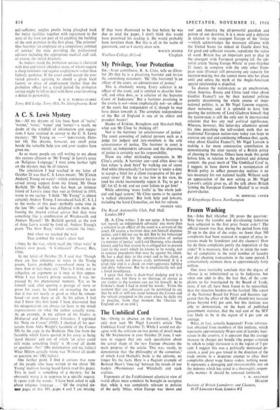My Privilege, Your Protection SIR,—Your contributor, R. A. Cline, tells
us (Octo- ber 28) that he is a practising barrister and makes the astonishing statement: 'He' (the barrister) 'is an officer of the court, an administrator of justice.'
This is absolutely wrong. Every solicitor is an officer of the court, and is entitled to describe him- self, and often does, as 'a solicitor of the Supreme Court of Judicature.' But a barrister practising in the courts is not—most emphatically not—an officer of the court, but independent of it, though he may have duties towards it. The complete independence of the Bar of England is one of its oldest and proudest boasts!
Shades of Erskine, Brougham and Marshall-Hall, what can Mr Cline be thinking of?
Nor is the barrister 'an administrator of justice.' The court consisting of judicial persons such as a judge (or judges) and jury-members is the sole administrator of justice. The barrister in court is merely an independent advocate and the dispensing of justice is certainly not his responsibility.
There are other misleading statements in Mr Cline's article. A barrister can—and often does—in fact refuse 'a dock brief' by walking out of court. And while (theoretically!) a barrister is 'under a duty to accept a brief for a client irrespective of his per- sonal views' if the fee is too low in his view, he (and his clerk) incontinently rejects it. Try to get a QC for £2 4s 6d. and see your failure to get him!
While admitting 'many faults' in 'the whole judi- cial and legal system,' Mr Cline seems to be against 'a radical alteration.' But both laity and lawyers, including the Lord Chancellor, are hot for reform.
London SW) [R. A. Cline writes: I do not agree. A barrister is not 'merely an independent advocate' any more than a solicitor as an officer of the court is a servant of the court. Of course a barrister does not himself dispense justice, and I did not say he did. But by his behaviour he is responsible for the administration of justice Ca minister of justice' said Lord Denning, who should know), and for that reason he is obliged not to present facts to the court which he knows to be wrong, nor to conceal precedents that may be against his client. He has a dual duty to the court and to his client, a tightrope walk not always easily performed. It is a good rule and is a check on over-aggressive fighting and dirty behaviour. But he is emphatically not just a hired mouthpiece.
I agree that there is dock-brief dodging and it is frowned on; but there is no shortage of choice as any visitor to the sessions can see for himself. As to Erskine's shade I had in mind his words: 'From the moment that any advocate can be permitted to say that he will or will not stand between the Crown and the subject arraigned in the court where he daily sits to practise, from that moment the liberties of England are at an end.1






































 Previous page
Previous page